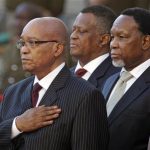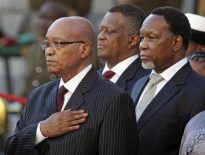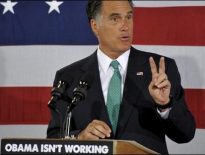By Ulf Laessing and Alexander Dziadosz
JUBA/KHARTOUM (Reuters) – When petrol started running
low in South Sudan’s capital this month, Peter Bashir Gbandi sensed a sinister force at work.

a largely damaged oilfield in Heglig April 23, 2012. REUTERS/Mohamed Nureldin Abdallah
Rather than blaming a severe shortage of dollars, which the newly-independent country needs to buy
imported fuel, the lawmaker pointed to arch rival Sudan – likely in league with Horn of Africa immigrants running filling
stations, he said.
A few days later, a member of Sudan’s parliament railed against the hundreds of thousands of
ethnic southerners living in Khartoum, many of whom do not hold passports and have never been to the South, demanding the
“fifth column” be expelled.
Breaking old habits is always hard, and in the case of Sudan and South Sudan – whose
leaders fought one of Africa’s longest and deadliest civil wars until 2005, before the countries split from each other last
July – it is proving nearly impossible.
The longtime foes have clashed repeatedly in their contested oil-producing
borderlands, and deep-rooted animosities mean they will probably keep at it until one of them collapses.
The two edged
dangerously close to resuming full-blown war this month when South Sudan seized the Heglig oil region from Sudan before
withdrawing on Friday in the face of international pressure and, Khartoum says, a military drubbing.
The South’s
withdrawal from Heglig eased the immediate crisis, but the political and economic aftermath of the incursion makes it less
likely the two will be able to transcend the grim logic of their decades-long conflict and resolve disputed issues any time
soon.
On both sides of the border, the fighting over Heglig has stoked old ethnic suspicions, excited jingoistic zeal
and hardened leaders into the conviction that peace is impossible as long as their old rivals remain in
power.
Gbandi’s diatribe about the ethnicity of owners of petrol filling stations shows just how deep
the distrust runs.
“Most of the fuel stations here are run by people whose allegiance is doubtful, so they can be used
as agents of the Arabs,” he said, shouting for several minutes on live radio. “It is time for clear decisions so that the
economy is in the hands of the sons of South Sudan.”
Rulers in the two countries face pressure from powerful domestic
politicians who advocate confrontation and deplore compromise with their opponent, analysts say.
These hardliners are
gaining the upper hand on both sides of the border, where deteriorating economies mean leaders are more dependent than ever
on the perception they are tough on their foes to shore up domestic legitimacy.
Before the countries broke apart, many
had hoped mutual dependence on the oil industry that underpinned both economies would deter such conflict – the landlocked
South took most of the crude output but needs pipes across Sudan to export it.
But disputes over transit payments, the
border, and other issues have halted almost all of the combined production, meaning that incentive to cooperate has all but
vanished.
“Both parties are working towards a change of regime in each other’s country,” Nhial Bol, editor of Juba’s
independent daily “The Citizen”, said, adding he doubted the two would be able to work out their differences at the
negotiating table.
OLD HATREDS FESTER
Sudan’s President Omar al-Bashir has repeatedly called the South’s
ruling Sudan People’s Liberation Movement (SPLM) “insects,” a play on their Arabic name, in recent weeks.
It is an
unsettling word in central Africa, where Rwandan Hutu extremists called their Tutsi enemies “cockroaches” before trying to
exterminate them in the genocide of 1994.
State television has grown increasingly fond of the label as it broadcasts
montages of whooping soldiers, corpses of South Sudan’s SPLA fighters and a downcast-looking South Sudanese President Salva
Kiir announcing the withdrawal from Heglig.
When Sudan’s armed forces declared Heglig “liberated”, thousands of
people poured into Khartoum’s streets, some demanding Kiir’s downfall and an end to talks. One chant calling for military
forces to enter Juba was especially popular.
All of this is an ill omen for opponents of Bashir’s ruling National
Congress Party (NCP) and proponents of reconciliation with the South. Some mutter darkly of authorities exploiting war fever
to crack down on dissent.
“Wisdom disappears during war,” said Farouk Abu Issa, head of the National Consensus Forces,
an umbrella group of Sudan’s main opposition parties.
He said South Sudan’s ruling SPLM party had made a mistake by
attacking Heglig, playing into the hands of Bashir’s NCP. Authorities had further “narrowed the margin of liberties and
human rights” in Sudan since the Heglig crisis, leveraging popular support for military action to label the ruling party’s
critics spies or traitors, he said.
“It is detrimental to our cause of getting rid of the ugly regime of the NCP, and
restoring democracy and the rule of law.”
For hardliners Heglig has been pure vindication.
Eltayeb Mustafa, a
relative of Bashir whose party’s Al Intibaha newspaper is Sudan’s most widely read, framed the South’s seizure of Heglig
as evidence a group of SPLM leaders were bent on overthrowing Khartoum and “colonising” north Sudan.
“The only
solution for the problem between the north and the south is to remove the SPLM,” he said during an interview in his modest
Khartoum offices.
Sudanese politicians who want to compromise with the SPLM – a group he brands the “Naivasha boys”
after the Kenyan location where northern and southern officials negotiated the 2005 peace deal – are losing ground, Mustafa
said.
“They are keeping silent. We are bombarding them every day.”
Western powers are also likely to watch for
signs of a return to the radical Islamism that coloured Khartoum’s politics in the 1990s when it hosted militants, including
Osama bin Laden. A U.S. trade embargo imposed in 1997 remains in place.
“SURPRISED AND DISAPPOINTED”
Passions
have also run high in Juba, the South’s ramshackle boomtown capital, where some call northerners “Jellaba,” a reference to
Arab slave traders who once prowled the South.
In an emotional speech to parliament near the outset of the crisis,
Kiir fired up southerners by telling them to get ready for war and admonishing U.N. chief Ban Ki-moon for asking the SPLA to
leave Heglig.
Hundreds of people, framing the border fight as a chapter in their decades-long struggle against
Sudan’s Arab-dominated government, joined street celebrations after the speech, some even demanding the SPLA seize Abyei,
another disputed area.
The oilfield grab was a sign to many the South could score a victory against Sudan’s much
larger army and dominant air force.
“We are not afraid of Sudan’s army … We managed to win independence and we will
win Heglig and Abyei,” Alfred Lado Gore, the environment minister, told a rally of about 1,000, mostly young people, who
burned a Sudanese flag and chanted “down with Bashir” and “down with Ban Ki-moon” for hours.
Even independent
newspapers and the parliament’s small opposition praised the army for teaching Khartoum a lesson after what the South calls
frequent air strikes inside its territory.
Many were disappointed when Kiir ordered the withdrawal.
“This is a
major decision, and I am telling you everybody I spoke to is not only surprised but disappointed about the withdrawal,” radio
journalist Mading Ngor said, hosting a heated live debate just hours after the pullout was announced.
Bol, the
newspaper editor, said Kiir pulled out troops in response to rising international pressure, but that he might order them back
to show Bashir his teeth.
“I don’t think the SPLA will withdraw completely from Heglig. They will keep parts … and
then come back again.”
ECONOMIC PRESSURE
One reason Kiir needs to play hardball with Khartoum, analysts say, is
to galvanise public support – especially among the South’s bloated army, which some officials estimate has as many as
200,000 soldiers.
Confrontation might also help Kiir deflect public anger over a rapidly worsening economic crisis
resulting from the January shutdown of the country’s roughly 350,000 barrel-a-day oil output, part of a row with Khartoum
over oil payments.
Food prices are soaring while fuel, cement and some medications have become harder to get as
importers struggle to get their hands on dollars.
“Supplies from the central bank have dwindled to a trickle,” one
executive at a privately-owned bank in Juba said. “We now get 10 to 15 percent of what we used to get in dollar allocations
… People have to turn to the black market.”
As a result, the South Sudanese pound is expected to lose even more
ground. A dollar now buys up to 4.2 pounds on the black market, compared to 3.5 before the shutdown.
With practically
no industry outside the now-defunct oil sector, South Sudan needs to import everything from basic food items to fuel trucked
in on bumpy roads from Kenya and Uganda.
Building up the war-battered country, plagued by violent cattle raiding and
widespread poverty, was never going to be easy, but corruption and cronyism have also hindered development.
Juba is
bustling with Toyota Land Cruisers – every senior official is entitled to two – and officials in designer suits and Rolex
watches dine in expensive restaurants on the White Nile, while Juba still has no power plant or water utility.
“The
government is not delivering anything,” a Western diplomat in Juba said. “But there will be support for Kiir if he stays
tough with Bashir in the face of a perceived military confrontation.”
Things are not much better in the north, where
the Sudanese pound hit a historic low against the dollar in the wake of the Heglig occupation, forcing some importers to
temporarily pause business because they could not get enough foreign currency.
With no oil deal in sight, and
Heglig’s central processing facility, which both countries use to separate water and impurities from crude, apparently badly
damaged – analysts say the two economies will struggle to recover.
The central processing facility is a vital piece of
infrastructure which separates water and impurities from crude before it is pumped into the pipeline.
But in the
north, the border fight may at least be a short term blessing for the government, as many citizens turn their thoughts away
from food or fuel prices and toward stability after a perceived threat from hostile outside forces.
“I think now the
people are not concerned with the living conditions … They are concerned with the national issue of Heglig,” Mustafa of the
Al Intibaha newspaper said.
“The economic situation in the north is not good, yes, but the situation in the south is
worse.”
LANGUAGE OF THE GUN
The best chance for averting further war and economic catastrophe has so far been
through African Union-brokered talks, but a resumption of those seems unlikely now as both sides seem to bet increasingly the
other will soon fall.
In addition to oil, the countries are at loggerheads over a long list of disputes including the
exact position of the 1,800-km border, the status of citizens in one another’s territories and the division of national
debt.
Speaking in Heglig on Monday, Bashir vowed Sudan would not return to talks because the South’s rulers “don’t
understand anything but the language of the gun”.
Other Sudanese officials are less absolute in their pessimism, but
still see little immediate prospect of a deal.
Sudan’s State Oil Minister Ishaq Adam Gamaa told Reuters on Sunday the
chance of the sides reaching a settlement soon was now “very remote,” and said Khartoum would probably demand compensation
for damage to Heglig before returning to talks.
Some diplomats hope China, the biggest buyer of southern oil and a
longtime friend of Khartoum, will try broker a deal. Kiir is due to pay a state visit to China this week.
But even
China, eager to avoid taking sides, may be hesitant to see itself as the key mediator, analysts say.
For now that
leaves little chance border fighting and attacks on strategic targets will die down soon, although neither side can really
afford to launch a full-scale invasion of the other’s territory.
As Magdi El Gizouli, a fellow at the Rift Valley
Institute think tank, wrote last week: “Khartoum and Juba have only adrenaline to compensate for their loss of oil.”





